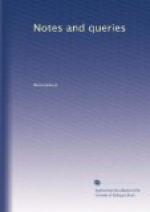J.U.G.G.
Bishop Lesly of Ross’ Epitaph.—Machoreus or Macorovius, “De Praelio Aveniniano."—Would any of your readers be so kind as to favour me with a copy of the Latin epitaph of Bishop Lesly, of Ross, inscribed on his tomb in the abbey church of Gurtenburg, near Brussels?
Can any one furnish the entire title and imprint of a Latin poem, De Praelio Aveniniano, said to have been written in 1594, by a Scottish Jesuit named Alexander Macorovius, or Machoreus? Any particulars concerning this author would gratify
LLEWELYN ST. GEORGE.
The Word “Cannibal."—When was the word Cannibal first used in English books?—To what language does it belong?—and what is its exact meaning?
W.
Sir William Rider.—“H.F.” would feel obliged by a reference to any work containing an account of Sir William Rider and his family. He was Lord Mayor of London in 1600; and his daughter Mary was married to Sir Thomas Lake, of Cannons, Secretary of State temp. James I. He wishes more particularly to ascertain the date of Sir William Rider’s death.
The Word “Poghele."—What is the etymology and precise meaning of the word “Poghele” (pronounced Poughley), or rather the first part of it, which occurs occasionally as the name of a place in the county of Berks, and perhaps elsewhere?
W.
Duncan Campbell.—Was the Duncan Campbell, of whom memoirs were written by Defoe, a real or an imaginary person? If the former, where can one find any authentic account of him?
L.B.
Boston de Bury de Bib. Monasteriorum.—Can any of your correspondents give me a reference to the original MS. of Boston de Bury de Bibliothecis Monasteriorum?
P.
Cazena on the Inquisition.—Can any one tell me what is the public opinion of Cazena’s work on the Inquisition? I see Limborch and many others quoted concerning that tribunal, but never Cazena. Is the book scarce?—or is it not esteemed? I never saw but one copy.
P.
The Reconciliation, 1554.—In 1554, Cardinal Pole directed a register to be kept in every parish of all the parishioners who, on a certain day, were to be reconciled to the Church of Rome and absolved. (Burnet’s Ref. vol. iii. p. 245.)
The Bishop of London’s Declaration thereon (Feb. 19. 1554) runs thus:—
“And they not so reconciled, every one of them shall have process made agaynst him accordyng to the canons, as the case shall requyre; for which purpose the pastours and curates of every paryshe shall be commanded by their archedeacon to certyfye me in writinge of every man and woman’s name that is not so reconciled.”
Have any of your readers at any time seen and made a note of such a register?
The most probable place of deposit would be the Bishop’s Registry, but I have never yet been fortunate enough to meet with one of these curious returns.




